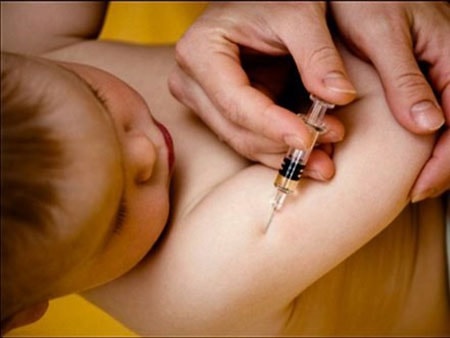Cases that should not be vaccinated against measles
One dose of measles vaccine is not enough to create high immunity for children. Two doses are needed according to the Expanded Immunization Program at 9 months of age and the second dose at 18 months of age.
For many reasons, recently, many parents have believed that vaccination is dangerous, so many parents do not fully vaccinate their children, leading to a very high risk of contracting diseases that were once considered eradicated in our country. Therefore, parents need to pay special attention and fully vaccinate their children according to the Ministry of Health's program, avoiding misconceptions that can be dangerous for children later.
The age of measles in children is usually after 6 months because under 6 months old, children still have immunity passed on from their mothers, if breastfeeding will protect them, however, in recent cases of the disease, the number of children who contracted the disease during breastfeeding is quite high, possibly because the mother has not been vaccinated against measles, has not yet had an immune response to measles, so there are still no antibodies to protect the child.
 |
Although the age for measles vaccination is 9 months, measles vaccine can still be given to breastfed babies and children under 9 months of age. Measles vaccine should only be given to children under 9 months of age when directed by the Expanded Immunization Program in case of necessity.
All cases of measles vaccination before 9 months of age should be vaccinated as soon as they turn 9 months old. The vaccination before 9 months of age does not count as 1 dose of vaccine. Children over 18 months of age who have not received two doses of measles vaccine should receive the full dose as soon as possible.
Breastfeeding women can receive the measles vaccine because antibodies are produced to protect the mother and are excreted in breast milk to protect the baby from measles when the baby cannot yet develop immunity on its own.
Children can get measles after vaccination, but it is mild and usually not contagious. Serious reactions to measles vaccination are rare but can occur.
In cases of fever or acute infection that is progressing, vaccination should be postponed. Vaccination can be resumed when recovered.
- Do not inject if allergic to vaccine
- Should not be injected in pregnant women
- Do not inject in cases of immunodeficiency
Those who have been tested for measles IgM serology and have a positive test result do not need measles vaccination.
People with suspected measles in the past but not diagnosed with measles should still receive measles vaccine.
When injecting measles vaccine, if for some reason (such as the child kicking) the injected dose is not enough, the injection cannot be re-injected but must wait until the next vaccination.
If you have been exposed to measles, the vaccine can prevent the disease if given within 72 hours of exposure. Vaccination within 6 days of exposure can prevent serious complications of the disease.
According to Tien Phong






